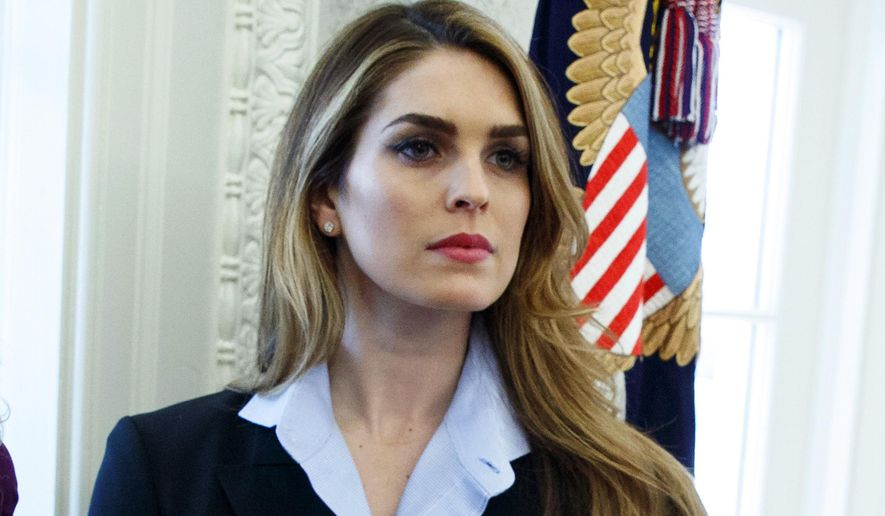The White House has told Hope Hicks and Annie Donaldson, two top former presidential advisers, not to turn over documents congressional Democrats have subpoenaed, saying President Trump needs to have a chance to look over the materials and see if any of them should be protected by executive privilege.
The move, which congressional Democrats revealed Tuesday, escalates a clash between Mr. Trump and House Judiciary Committee Chairman Jerrold Nadler, who is conducting his own version of special counsel Robert Mueller’s probe into Mr. Trump.
The White House says all of Mr. Nadler’s inquiries need to go through it, since Mr. Trump has legal rights he may need to assert.
But Mr. Nadler rejected that, saying that Ms. Hicks and Ms. Donaldson, who both left the White House a while ago, took the documents with them, putting them outside the reach of Mr. Trump’s privilege.
“The president has no lawful basis for preventing these witnesses from complying with our request,” Mr. Nadler said.
He said he’s also looking to have the women testify.
Ms. Hicks was a senior campaign aide and then a top communications adviser to Mr. Trump in the White House. Ms. Donaldson was chief of staff for the White House counsel’s office.
Her notes of the goings-on at the White House provided the basis for many of the more fascinating moments captured in Mr. Mueller’s report on Mr. Trump.
Mr. Nadler acknowledged that Ms. Hicks had agreed to turn over some documents.
A Republican congressional aide said that proved Mr. Nadler was blowing things out of proportion. The documents Ms. Hicks is providing aren’t “under control of the White House,” the aide said, so she is able to turn them over.
But the other documents Mr. Nadler seeks are White House property and the president deserves a chance to exert privilege over them, the GOP aide said.
“This isn’t about ignoring subpoenas — it’s about following standard operating procedure for documents that don’t belong to Ms. Hicks or Ms. Donaldson, may be subject to certain privileges, and they, therefore, are unable to provide,” the aide said.
Even as the dispute over Ms. Hicks and Ms. Donaldson boiled over, the Trump administration made overtures elsewhere to Mr. Nadler.
The Justice Department said there could be room to negotiate over giving Congress access to more of Mr. Mueller’s work — if Mr. Nadler cools his zeal for contempt of Congress against Attorney General William Barr. That means putting off a major showdown vote scheduled for next week in the House.
House Majority Leader Steny H. Hoyer said he will bring a contempt citation against Mr. Barr and former White House Counsel Don McGahn. That citation would authorize Mr. Nadler to sue in court to get a federal judge to referee the document disputes.
Democrats, racked by divisions over whether to begin the impeachment process against Mr. Trump, are unlikely to squelch the contempt vote because it offers them a chance at unity.
Yet Mr. Barr’s offers to cooperate could undercut the eventual legal arguments of House Democrats.
Assistant Attorney General Stephen E. Boyd said in a letter to Mr. Nadler that a deal was reached with the House intelligence committee on documents, and that could also happen with Mr. Nadler.
“The only reason we were not able to engage in a similar accommodation with the Judiciary Committee is that you insisted on taking the unnecessary step of holding a contempt vote less than three weeks after issuing the subpoena, at a time when negotiations were ongoing,” Mr. Boyd wrote.
Mr. Nadler rejected the Justice Department’s demands Tuesday, saying it’s the threat of contempt that has gotten Mr. Barr to the negotiating table.
“We urge you not to make the mistake of breaking off accommodations again. We are here and ready to negotiate as early as tomorrow morning,” he said.
• Stephen Dinan can be reached at sdinan@washingtontimes.com.
• Gabriella Muñoz can be reached at gmunoz@washingtontimes.com.




Please read our comment policy before commenting.